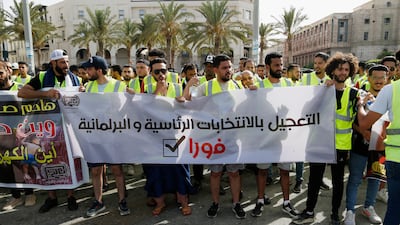The UN's Libya envoy told the Security Council on Monday that he will launch a new initiative aimed at enabling presidential and legislative elections to take place in 2023.
Abdoulaye Bathily, special representative of the Secretary General for Libya, said he will establish a high-level steering panel that will bring together all “relevant” Libyan stakeholders.
These include representatives of political institutions, major political figures, tribal leaders, civil society organisations and others, he said.
The aim is for them to reach a consensus on elections while not supplanting any relevant Libyan institutions.
The UN envoy highlighted the Libyan people's frustration with the lack of elections: They were originally scheduled for December 2021 but have yet to happen amid disagreements over election laws.
“Libyans are impatient. They question the will and desire of political actors to hold inclusive and transparent elections in 2023,” Mr Bathily said.
The elections-enabling mechanism will seek to finalise the constitutional basis and a road map with “clear” steps towards elections.
Since the failure to hold a vote in December 2021, Libya’s political leaders have gone around in circles with competing proposals for the constitutional basis of elections.
The country has two competing governments and acting prime ministers.
In February 2022, a coalition of parliamentarians in eastern Libya sought to exploit the stalemate created by the failed national elections and nominated Fathi Bashagha as prime minister-designate of a new Government of National Stability.
The goal was to challenge Abdul Hamid Dbeibeh, appointed interim prime minister of Libya in 2021, and prevent his western-backed Tripoli-based Government of National Unity from ruling.
The development ran counter to UN efforts to end internal strife in Libya.
Mr Bathily said Libya’s political class is undergoing a “major legitimacy crisis”.
The UAE’s deputy ambassador to the UN, Mohamed Abu Shahab, noted that the political stalemate has “not only prolonged the process and made it repetitive, but it has also taken a turn which does not serve the national interests of the Libyan people”.
“Therefore, we do not see a way out of this political impasse other than coming together and supporting Mr Bathily’s efforts in enabling Libyans in reaching a Libyan-owned political settlement that is acceptable to all parties,” he said.
Barbara Woodward, Britain’s ambassador to the UN, welcomed the UN envoy’s commitment to “reinvigorating the political process to deliver elections for Libya”.
“We have a clear opportunity to progress long term stability and meet the expectations of the country,” she said.


